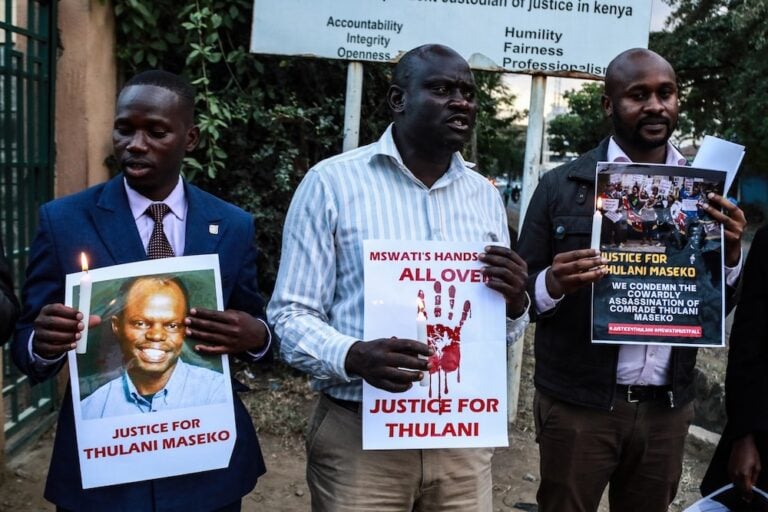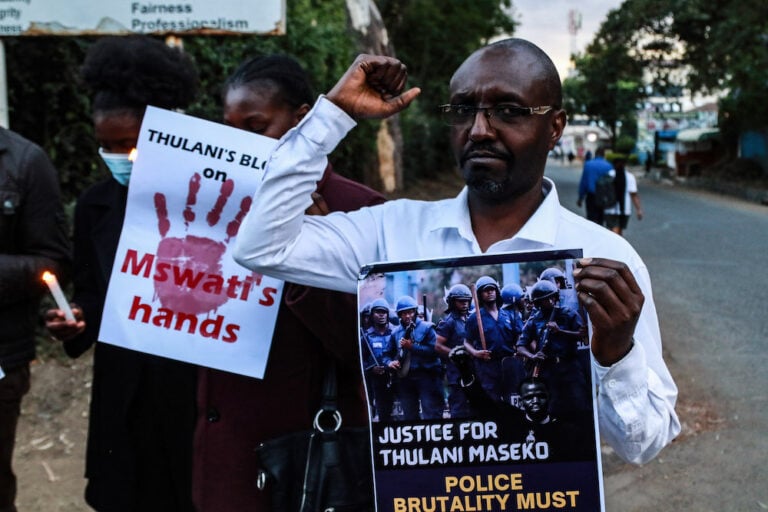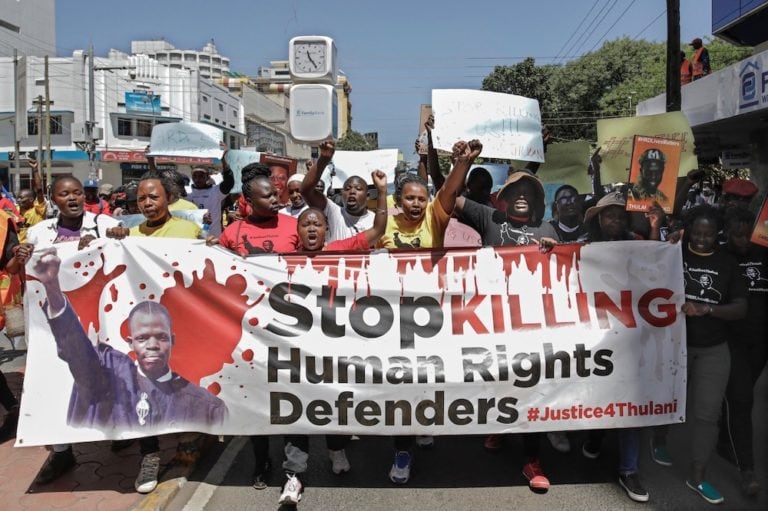The following is an 18 February 2000 joint statement on the closure of the Swazi group of newspapers: TO: Senator Magwagwa Mdluli Minister of Public Service and Information Fax: +268 40 45379 Dr Sibusiso Dlamini Prime Minister of the Kingdom of Swaziland Fax: +268 40 43943 Mr Themba Dlamini Managing Director, Tibiyo Takangwane Fax: +268 […]
The following is an 18 February 2000 joint statement on the closure of the Swazi group of newspapers:
TO:
Senator Magwagwa Mdluli
Minister of Public Service and Information
Fax: +268 40 45379
Dr Sibusiso Dlamini
Prime Minister of the Kingdom of Swaziland
Fax: +268 40 43943
Mr Themba Dlamini
Managing Director, Tibiyo Takangwane
Fax: +268 518 4468
RE: STATEMENT ON THE CLOSURE OF THE SWAZI GROUP OF NEWSPAPERS
We, the undersigned, are appalled and astonished by the closure on February 17 of the state-owned Swazi Observer newspaper, just days before Swaziland’s official hosting of the Annual Conference of SADC.
The closure announced late yesterday (Thursday 17 February) to the staff by the Chairperson of the Board, Mr Timothy Nhweko, was preceded by a concerted campaign to force four journalists (two
reporters and two editors) to disclose confidential sources of information in relation to a series of articles published since late last year.
The campaign included:
– A senior reporter (Mr Thulane Mtetwa) being summoned by the police to explain why the newspaper had published an article in December about a suspect linked to a 1998 bomb explosion in Swaziland. The police were apparently upset by the story which they felt had scuppered their efforts to make an arrest. The report, however, had not named the suspect.
– Mtetwa being summoned twice by the Commissioner of Police, Mr Edgar Hilary, on January 10 and 11, to disclose the identity of a source who had leaked a letter to the newspaper. The letter was written by Hilary to his counterpart in South Africa.
– Mtetwa, along with his news editor, Mr Musa Magagula, being summoned by the Attorney General, Mr Phesheya Dlamini, on January 12, where they were again pressured to reveal the identify of the source who leaked the letter. The Attorney General later during January making
an unsuccessful attempt to obtain an ex parte order from the High Court to force the journalists to reveal their source.
– The newspaper in the first week of February, after legal advice, handing over to the Attorney General the letter received by the newspaper – but refusing to disclose the source from which it had been obtained. On Tuesday this week (February 16) Mtetwa, Magagula, as well as Mr Francis Harawa, the Managing Editor, and another senior journalist, Mr Thulani Thwala, being summoned by the newspaper’s Board of Directors and again being pressured to disclose the name of their source.
They refused again and were reportedly warned by the Board that their refusal would have “devastating consequences” for the newspaper. On the same day all four were later summoned to the office of the Prime Minister, Dr. Sibusiso Dlamini, who also unsuccessfully demanded the name of their source.
Our strong belief is therefore that the newspaper has been closed for no other reason than to punish the editorial staff for refusing to give in to the pressure of the State. The Swazi state’s concerted campaign to force the journalists to disclose confidential sources of information, and its decision to close down the newspaper in the face of their refusal, is a grave violation of the principles of
media freedom.
The violations include the refusal of the State to respect the editorial independence of the newspaper as well as internationally recognized ethical principles of journalism which forbid journalists to disclose confidential sources of information. The Swazi Observer is owned by the Tibiyo Takangwane Company, which in turn is owned by King Mswati III on behalf of the Swazi nation. Reliable sources in Swaziland claim that the order to close the newspaper came verbally
from the King.
Claims are apparently being made that the paper has been closed for purposes of restructuring and financial reorganisation. However, staff of the newspaper say that at a strategic planning meeting, sponsored by the Board and shareholders last week, a five-year plan was drafted for the newspaper and there was no mention of any financial difficulties facing the newspaper.
We further note that the first SADC draft protocol on Culture, Information and Sport is currently being discussed by member states. The behaviour of the Swazi State is a contravention of the spirit of the draft protocol which instructs member states in Article 19 to “Take necessary measures to ensure the freedom and independence of the media”, and in Article 16 enjoins member states to “cooperate and collaborate in the promotion, establishment and growth of independent media, as well as (the) free flow of information”.
Endorsed by:
Freedom of Expression Institute (FXI)
Media Institute of Southern Africa (MISA)
South African National Editor’s Forum (Sanef)
South African Union of Journalists (SAUJ)
Media Workers Association of SA (MWASA)
Freedom Forum
Open Society Initiative – SA
Article 19 – SA,
Southern Africa Human Rights NGO Network (Sahringon)
Recommended Action
Similar appeals can be sent to:
Senator Magwagwa Mdluli
Minister of Public Service and Information
Fax: +268 40 45379
Dr Sibusiso Dlamini
Prime Minister of the Kingdom of Swaziland
Fax: +268 40 43943
Mr Themba Dlamini
Managing Director, Tibiyo Takangwane
Fax: +268 518 4468
Please copy appeals to the source if possible.


